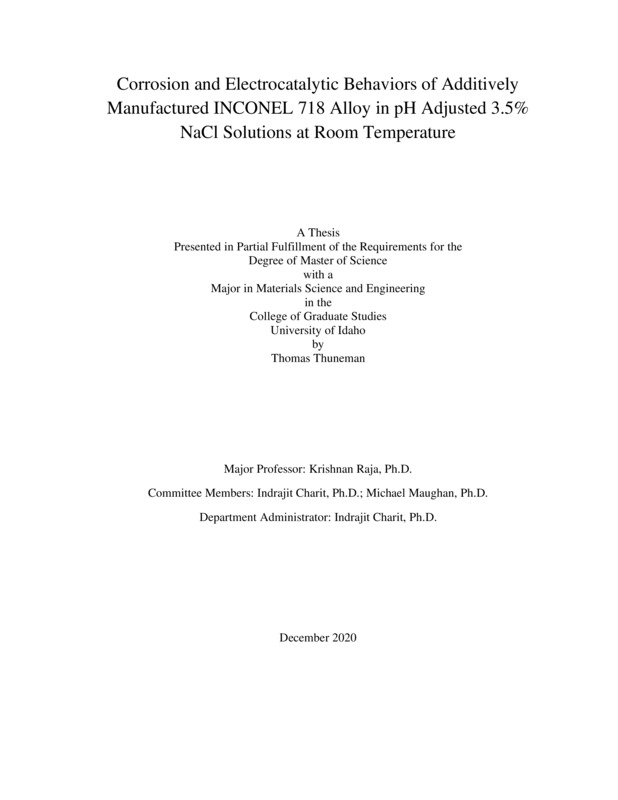Corrosion and Electrocatalytic Behaviors of Additively Manufactured INCONEL 718 Alloy in pH Adjusted 3.5% NaCl Solutions at Room Temperature
Thuneman, Thomas William Caylor. (2020-12). Corrosion and Electrocatalytic Behaviors of Additively Manufactured INCONEL 718 Alloy in pH Adjusted 3.5% NaCl Solutions at Room Temperature. Theses and Dissertations Collection, University of Idaho Library Digital Collections. https://www.lib.uidaho.edu/digital/etd/items/thuneman_idaho_0089n_12025.html
- Title:
- Corrosion and Electrocatalytic Behaviors of Additively Manufactured INCONEL 718 Alloy in pH Adjusted 3.5% NaCl Solutions at Room Temperature
- Author:
- Thuneman, Thomas William Caylor
- Date:
- 2020-12
- Keywords:
- Additive Manufacturing Electrochemistry Inconel 718 Selective Laser Melting
- Program:
- Chemical and Materials Science Engineering
- Subject Category:
- Materials Science; ; Engineering
- Abstract:
-
INCONEL 718 is a heat treatable Ni-Fe-Cr-Mo alloy used in a wide range of temperatures (23 – 977 K) because of its superior strength, toughness, and resistance to creep and corrosion. It is a material of choice for components of aircraft engines, gas turbines, oil drilling equipment, nuclear reactors, cryogenic tanks, heat exchangers, and liquid fueled rockets. Additive manufacturing (AM) techniques are implemented to manufacture near net shape components out of INCONEL 718 because of the complexity of design of the components and to minimize the machining cost. Selective laser melting (SLM) is one of the AM techniques which uses a laser beam to selectively melt a layer of alloy powder. The layered melting helps build the required 3D shape of a component. The high energy density melting also leads to very high cooling rates in the order of 106ºC/s. Therefore, SLM process results in isotropic, fine grained microstructures with metastable phases that are not usually obtained in conventional manufacturing processes such as casting or forging. The objectives of this study are to: a) evaluate the corrosion behavior of additively manufactured INCONEL 718 in 3.5% NaCl solutions with varying pH (1.25, 6.25, and 12.25) and correlate with different microstructural conditions obtained by hot isostatic pressing (HIP), and two-step aging treatments; b) compare the corrosion resistance of the additively manufactured material with the conventional wrought material, and c) investigate the electrocatalytic behavior of AM-718 material for hydrogen and oxygen evolution reactions for possible applications as electrodes in water electrolyzers.Cyclic polarization, potentiostatic, and electrochemical impedance spectroscopy measurements were carried out on the INCONEL 718 alloy specimens in four different microstructural conditions. The results showed that the as-printed specimens showed better corrosion resistance than the wrought material in the acidic chloride solution. HIP specimens exhibited superior corrosion resistance to the as-printed ones. Heat treatment resulted in a reduction of overall corrosion resistance. The Tafel slopes for the HER were higher in the as-received samples compared to their heat-treated counterparts in all the pH conditions with samples tested in a basic environment showing the lowest Tafel slopes. The room temperature corrosion properties are relevant for oil field applications, and electrochemical machining of Inconel 718.
- Description:
- masters, M.S., Chemical and Materials Science Engineering -- University of Idaho - College of Graduate Studies, 2020-12
- Major Professor:
- Raja, Krishnan S
- Committee:
- Charit, Indrajit; Maughan, Michael
- Defense Date:
- 2020-12
- Identifier:
- Thuneman_idaho_0089N_12025
- Type:
- Text
- Format Original:
- Format:
- application/pdf
- Rights:
- In Copyright - Educational Use Permitted. For more information, please contact University of Idaho Library Special Collections and Archives Department at libspec@uidaho.edu.
- Standardized Rights:
- http://rightsstatements.org/vocab/InC-EDU/1.0/

